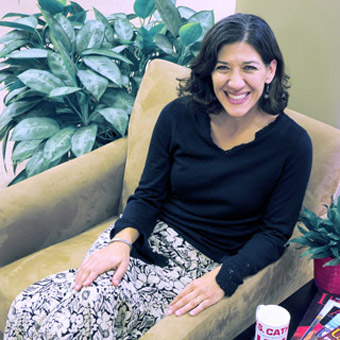Are full family schedules masking emptiness of spirit? A Catholic ethicist and suburban mom challenges families to make time for the really important stuff.
Because Julie Hanlon Rubio’s father was a civil rights attorney, the family’s dinner table discussions during her childhood often revolved around his work. “Just having that consciousness rather than always talking about our own lives was important for all of us,” she says.
When she and her husband started their own family, dinner conversation continued to range far beyond soccer and school. “But what I really wanted,” she says, “was for our kids to have contact with people who were poor—beyond just collecting cans or putting together a Thanksgiving basket.”
Hanlon Rubio’s work as an ethicist at Saint Louis University has drawn directly from her real-life experience of trying to make the works of mercy and justice as central to her family as homework and sports. She felt oddly like a pioneer. Even while studying for her Ph.D., she says, “my professors were visibly not happy with me when I turned up pregnant once and then twice. It’s not what theologians do.” Hanlon Rubio begs to differ.
“I don’t know that we have many models—which is fine, really,” she says. Drawing from the marriage liturgy, sacramental theology, lay movements such as the Christian Family Movement, and adding Catholic social teaching on the family, Rubio stitched together her family ethics. “If I really believe that I am trying to form my kids as disciples,” she says, “then I have to ask: How does each activity contribute to that?”
You’ve said that typical suburban Catholic parents feel a certain emptiness in their lives. Why?
It comes out of my own experience of hearing that everyone is busy, which means that so many interactions are on the surface.
Many of my moments with other families are as we run past each other at games, at picnics, at all these different activities. So often people say that they lack the time to be with each other, to be at home with their kids or their spouse.
I hear, “We have these great friends, but we so rarely get a chance to see them.” Many married couples rarely have a date night: There’s no money for a baby-sitter, and after driving the kids everywhere all week, they’re tired.
It’s not that people are doing things that are bad or useless or selfish—they’re doing lots of really good things, but there’s a depth that seems to be lacking. A lot of people speak of something missing.
So where do we find resources in the Christian tradition to help guide the family? And what do we do with the parts of our tradition that say, go to the desert, sell all your possessions, leave your family?
I think we should listen to that stuff, actually. When students come to my class and they hear that Jesus says hate your family (Luke 14:26), they’re sure I’m making this up. It’s really important to wrestle with these sayings, to ponder how family can become an idol if it’s lived in a certain way.
How can family be an idol?
There is a real danger in putting all of your focus on the family, of putting all your energy there, especially for middle class families. We talk about helicopter parents and wanting your kids to have the best: These are highly prized cultural values. While I’m not so sure that we really put marriage first, as we sometimes claim, we certainly do put the kids and the house and the resources first.
That can really be a form of idolatry, and I think that’s what Jesus and the early Christians worried about. Can you get too caught up in family, so that you don’t have to think about what it actually means to be a disciple? Should I translate discipleship so fast into just doing everything for my family?
In Pope John Paul II’s theology, what’s really striking is the emphasis on marriage as a communion of love between two people which then moves outward. The same thing happens when we’re at Eucharist: There’s something that happens internally to us as a church community but then we’re supposed to go forth from that.
John Paul II is very explicit in his writing that it starts with love and usually children. But even if couples don’t have children, that doesn’t mean that they don’t have a fruitful marriage. You can be spiritually fruitful if you’re not physically so. But he says you can’t stop there, because in a Christian marriage you go outward to serve society and serve the church. That’s our theology of marriage, but I don’t think we ever get past the first two parts, marriage and children.
So what should be the place of family?
We can think about our families as small Christian communities. We’re not just about getting the best house, education, jobs, but moving out into the world to do something about Matthew 25, “Lord, when did we see you hungry?”
How do we bring the works of mercy and justice to family life? For most people I think those are very disconnected. Some have that commitment, but maybe it’s just in how they vote or where they give their money. But in terms of how they actually live their family life, it’s not so much there.
My Italian immigrant grandparents had to put virtually all of their energy into family and had to sacrifice for that. In that context I realize what I’ve said sounds really odd. But two generations later many of us have more than enough, and now we can begin to think about how to expand beyond the family.
How can families pull this off?
There are some real choices to be made. In St. Louis, a big sports town, kids’ games are scheduled from Friday night until Sunday night, so if you have three or four kids, you could be going to games all weekend.
We started our kids a little bit later, even though everyone told us we had to start them on a sport by the time they were 4. We were very hesitant to do Sunday games, and we limited it to two teams total for the family at one time. That gave us some sanity over the weekends.
One of our family traditions is that we get a pizza and watch a movie together every Friday night. And we’ve been able to do some service, make it to church, and have dinner together. Those things were able to happen because we gave up on some of the other things that would have kept us too busy.
If I really believe that I am trying to form my kids as disciples, then I have to ask: How does each activity contribute to that? If so much energy is going to things that really aren’t forming us into being certain kinds of persons, then I’m not sure what we’re doing. Let’s really ask: What do I want to be? What do I want our marriage to be? What do I want my kids to be?
I notice that among my students, the ones who are really extraordinary in their faith as well as in their social justice commitments often come from families who have stepped off that busyness track. These kids have something in them that says, “I don’t really need to do all those things.” But there are no guarantees, right? There’s also the possibility your kids might totally rebel from that.
One of my sons has said to me, “I don’t like this whole simple lifestyle stuff. I really can’t stand it.” I say to him, “But you live the absolute simple life.” He’s worn the same pair of pants almost every single day to school because he likes them. He does not care about clothes.
I ask him, “Don’t you think it’s a good idea to have less stuff so you can give money away?” “Well yeah,” he says, “but I don’t like the simple lifestyle.”
What he really doesn’t like is the aesthetic: wood and candles and all that stuff that I love. He likes computers. But he doesn’t care about money or things. So I have to provide a way for him to think about living simply that doesn’t bring to mind candles or hippies with beards, but something that will work for him.
Can the parish help families with these questions?
If you ask people, “Do you have a lot of friends in your parish?” they’ll say no, not really. And people aren’t really dissatisfied with their parishes because they don’t want that much from the parish. We’ve got so many different communities we’re trying to be part of, with extended families who live far away, and your work, and his work, and kids’ schools. There are so many different groups that it’s hard to invest.
How would a parish attract families to engage in service and to learn about social justice?
It would start with creating community. With lots of low-key events with free food where people can just get together. In today’s larger parishes we have to create smaller groups within the parish.
If you want your kids to care about parish, it has to be more than a one-stop deal. If they don’t know people there, if they don’t have fun there, if they don’t feel supported, they’re not going to feel connected there. They’re not going to want to invest in that later, either. It’s not going to feel like home if they’re never there.
A parish can begin to reflect on the things that are taking up parishioners’ time. Are we asking people to put a lot of time into special events that parallel those in the secular culture, like auctions and carnivals that take up a lot of volunteer hours and maybe don’t create the kind of community that parishes would really want to see?
Some suburban parishes actually have auctions where you pay different amounts of money to sit at different kinds of tables and receive different levels of drinks—beer versus top-shelf liquor. I can’t imagine sitting at another table and having a better drink than somebody else. The pastor says that we need the money to do the programs. But we have to think about what we need the money for and how else we might be able to raise it.
How can a parish help families get involved in service?
Start by asking: Are we making service a regular part of parish life for families? Is it a part of the religious education program, for example? In most parishes I’m familiar with in the Midwest, what’s really central to parish life is sports. But if that’s what we’re doing all weekend long, then how can we possibly have time to do other things? Could we come together to create community around a nursing home instead of the soccer field?
And then the parish should offer space for reflection. Could we host a session or two and ask parents to reflect on what they’re doing with their time and what they want to be doing? Parishes can give them suggestions, concrete proposals, and offer to partner with them to help make this possible. I’d love to see a panel of couples talking about how they’re trying to integrate their faith into their lives and then have people respond to that. I have never seen anything like that.
People would be reluctant to speak because nobody thinks they’ve got it down, that they’re doing it right. But even just to have a place for conversations like that would be important.
Some families are hesitant to do service with the poor because they think their kids won’t be safe.
One way to start is with children. We organized our parish youth group to take children who were staying at the Catholic Worker shelter to a park or to the zoo. I matched them up one to one with the youth group members, who then really felt like they had something to do. They were just talking to one kid, and that worked out well. And it didn’t feel like service because we were doing something fun.
The truth is that we don’t tend to live close to people who need us. This is where fear comes in: If we’re so worried about keeping our family safe, then we can’t cross those lines. And sometimes we just need to know that it’s an exaggerated fear. People are not often killed on the street.
The ideal is that we move from just helping the poor to actually trying to build some relationships. That would transform parishes and families.
In your recent book you say that service is one of five practices families should adopt if they want to live out their faith. What are the others?
One is sex, which originally I didn’t even consider, but then it became obvious to me. What would it mean to have a virtuous sex life?
Catholics tend not to talk about that because we’ve put so much energy into thinking about when sex isn’t appropriate. Popular women’s magazines talk about how keeping up a regular sexual practice is difficult to do; my concern is why would that be important in a Christian marriage.
When you think about sex as a practice, it has the potential to make people feel more vulnerable in each other’s presence, more united, more like they belong to each other.
Another practice involves eating. Jesus’ practice of eating with sinners is widely affirmed by New Testament scholars of every stripe. He did this before the sinners asked for forgiveness. It would have been considered one of the most radical things that he did, maybe among the issues leading to his execution. So that radical practice of sharing a table with sinners and not worrying about sending the wrong message or implying that you accept everything about that person—that’s a fundamental Christian practice.
Also food is second only to transportation in how we can reduce our impact on the planet. Eating is something you do every single day. You can choose to do it in a certain way that has implications for the world.
Surely this is working its way around to money, isn’t it?
You guessed it. Most Catholics believe that they should give some of their money away. The difficulty is figuring out when we have excess and how much we can really give.
That’s why I like tithing because it’s a regular practice—maybe not 10 percent, but a percentage that varies depending on your circumstances. Studies on charitable giving clearly state that families who give a fixed percentage every month give more than people who just give whenever they feel like it.
Let’s also ask whether we can live a bit out of step with our station in life. Can we live a step down in order to tithe? Families can decide together what might be good charities, which is another way of getting families to think, “What are we really about?”
Our kids, for example, know that there are things that we could buy but we don’t—an Xbox, for example—because we want to keep giving.
And that brings us to the last practice, prayer. When I first started talking about the importance of families doing service and social justice, another theologian said to me, “That’s all well and good, but other families do that, too. The really hard thing would be to actually pray with your kids.”
He had teenagers at the time, and that has proved to be a wise saying. It’s probably the most radical thing you can do. Aside from grace before meals, very few people are doing any prayer with their kids, especially once you move past the preschool years.
So what’s the secret?
You start by trying to at least create some quiet in the midst of all the busyness for reflection, connections, and centering yourself. Then bring in some text, prayers, music, images. So you end up with some gratitude, some readings, some reflection.
One of the things our family does during Advent is draw names: We’re supposed to pray for the person and do little things for them. On Christmas Eve we reveal who we had, and you’re supposed to say how the other person brings Christ to the world.
That has been a really beautiful thing; even my three young boys were able to do this beautifully. I’m there thinking, “Wow, are you really saying this about your brother? That’s amazing.” They never would be saying those things if we hadn’t created the space for that
Which leads me to think that if you can overcome your own embarrassment and discomfort and find your way towards something that feels comfortable and enriching, you might be surprised at what your family can do.
This article appeared in the February 2011 issue of U.S. Catholic (Vol. 76, No. 2, pages 34-37).
Image: Photo of Julie Hanlon Rubio by Tom Wright













Add comment